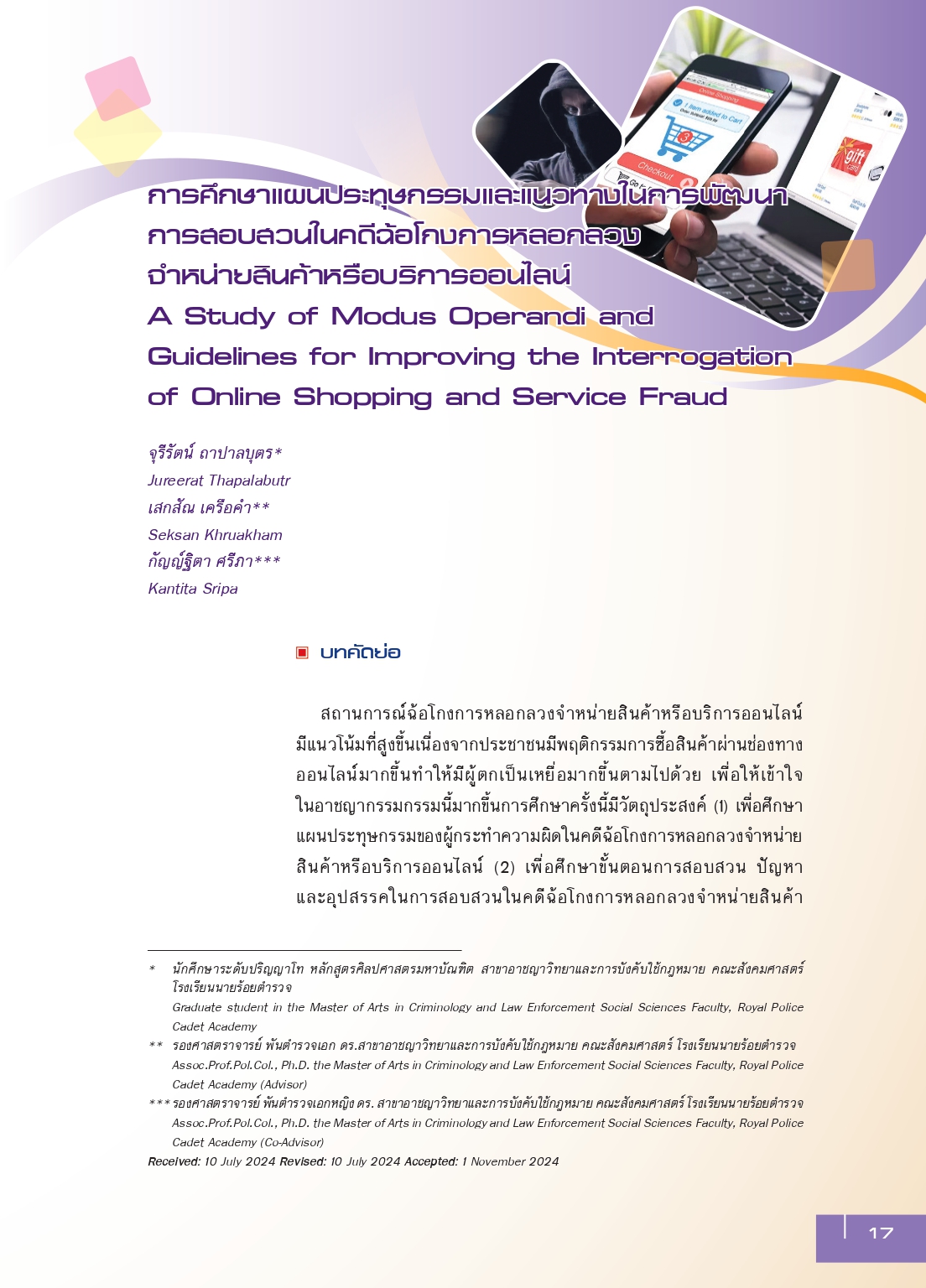การศึกษาแผนประทุษกรรมและแนวทางในการพัฒนาการสอบสวนในคดีฉ้อโกงการหลอกลวงจำหน่ายสินค้าหรือบริการออนไลน์
Main Article Content
บทคัดย่อ
สถานการณ์ฉ้อโกงการหลอกลวงจำหน่ายสินค้าหรือบริการออนไลน์มีแนวโน้มที่สูงขึ้นเนื่องจากประชาชนมีพฤติกรรมการซื้อสินค้าผ่านช่องทางออนไลน์มากขึ้นทำให้มีผู้ตกเป็นเหยื่อมากขึ้นตามไปด้วย เพื่อให้เข้าใจในอาชญากรรมกรรมนี้มากขึ้นการศึกษาครั้งนี้มีวัตถุประสงค์ (1) เพื่อศึกษาแผนประทุษกรรมของผู้กระทำความผิดในคดีฉ้อโกงการหลอกลวงจำหน่ายสินค้าหรือบริการออนไลน์ (2) เพื่อศึกษาขั้นตอนการสอบสวน ปัญหาและอุปสรรคในการสอบสวนในคดีฉ้อโกงการหลอกลวงจำหน่ายสินค้าหรือบริการออนไลน์ และ (3) เพื่อศึกษาแนวทางในการพัฒนาการสอบสวนของเจ้าหน้าที่ตำรวจในคดีฉ้อโกงการหลอกลวงจำหน่ายสินค้าหรือบริการออนไลน์ ใช้การวิจัยเชิงคุณภาพสัมภาษณ์เชิงลึกกลุ่มผู้ให้ข้อมูลสำคัญ ได้แก่ กลุ่มเจ้าหน้าที่ตำรวจจากกองบังคับการตำรวจสืบสวนสอบสวนอาชญากรรมทางเทคโนโลยี 1 และ 2 และสถานีตำรวจท้องที่ จำนวน 6 คน กลุ่มประชาชนผู้ตกเป็นเหยื่อ จำนวน 6 คน ผลจากการศึกษา พบว่า การฉ้อโกงหลอกลวงจำหน่ายสินค้า มักเกิดขึ้นบนเฟชบุค สินค้าที่ผู้กระทำความผิดเลือกใช้ในการหลอกลวงจะขึ้นกับเทศกาลหรือความต้องการสินค้าในช่วงเวลาขณะนั้น รูปแบบการฉ้อโกงที่พบมากที่สุดคือการไม่ส่งสินค้าให้กับเหยื่อหลังเหยื่อได้โอนเงินชำระค่าสินค้าไปแล้ว สำหรับวิธีการสอบสวนที่สำคัญคือการตรวจสอบเส้นทางการเงินเพื่อตามหาผู้กระทำความผิด ทว่ากลับพบปัญหาที่ผู้กระทำความผิดมีการนำบัญชีม้ามาใช้ ปัญหาในการติดต่อประสานงานกับธนาคารเพื่อขอข้อมูลบัญชีต้องสงสัยในคดี และปัญหาเจ้าหน้าที่ตำรวจขาดทักษะทางเทคโนโลยี ดังนั้น แนวทางในการพัฒนาจึงควรให้มีการฝึกทักษะความรู้ความสามารถทางเทคโนโลยีของเจ้าหน้าที่และการพัฒนาความร่วมมือจากหน่วยงานภายนอกเพื่อที่จะสามารถรับมือปัญหานี้ได้อย่างประสิทธิภาพในอนาคต
Article Details

อนุญาตภายใต้เงื่อนไข Creative Commons Attribution-NonCommercial-NoDerivatives 4.0 International License.
ต้นฉบับที่ได้รับการตีพิมพ์ในวารสาร เป็นลิขสิทธิ์ของวารสารกระบวนการยุติธรรม แต่ความคิดเห็นที่ปรากฏในเนื้อหาของบทความในวารสารกระบวนการยุติธรรม ถือเป็นความรับผิดชอบของผู้เขียนแต่เพียงผู้เดียว
เอกสารอ้างอิง
Cross, C., & Blackshaw, D. (2014). Improving the police response to online fraud. A Journal of Policy and Practice, 9(2), 119–128.
Douglas, J. E., Burgess, A. W., Burgess, A. G., & Ressler, R. K. (1997). Crime Classification Manual: A Standard System for Investigating and Classifying Violent Crimes. Jossey-Bass.
Emami, C., Smith, R. G., & Jorna, P. (2020). Predicting online fraud victimisation in Australia. Trends & Issues in Crime & Criminal Justice, 1–20. https://doi.org/10.52922/ti04015
Fosdick, R. B. (1916). Modus Operandi System in the Detection of Criminals. Journal of Criminal Law and Criminology, 6(4), 560 -570.
Hathaichanok Pimpakul. (2019). The causes of online fraud victimization. Graduate School Conference. Suan Sunandha Rajabhat University.
Kairuddin Karim, Herman B. SH. Mh, Muh. Akbar Fhad Syahril. (2021). Criminological Analysis of Online Buying Fraud. DME Journal of Law, 2(1), 10-16.
Korachat Matsri, & Thamavit Terdudomtham. (2022). Guidelines for addressing problems and obstacles of Technology Crime Suppression Division Officers: A case study of online fraud offences. Ramkhamhaeng Journal of Public Administration, 5(3), 76-100.
Ministry of Commerce. (2021). Commerce reveals COVID-19 push, Online urchases increased by 0.45. https://www.price.moc.go.th/price/fileuploader/file_admin_sum/news_survey-042564.pdf
Nutthorn Dechsakul & Jomdech Trimek. (2020). Online Shopping Frauds in Thailand. RSU National Graduate Research Conference 2020. (pp. 1141-1151). Rangsit University. https://rsucon.rsu.ac.th/files/proceedings/nation2020/NA20090.pdf
Sarit Suebpongsiri. (2017). Offender’s Modus Operandi versus Signature crime: The similar but different. Journal of Criminology and Forensic Science, 3(2), 37-52.
Sarunpat Yotsombat. (2020). Guidelines on capacity building and development of the police officers at the police station level for efficiency enhancemen in the preventionand suppression of information technology-related crimes [Doctor of Laws Dissertation]. Sripatum University.
Seksan Khruakham. (2019). Crime, Criminology and Criminal Justice (2nd Ed.). Phetkasem Printing Group.
Yu-Teng Chang, Hung-Teng Chang, and Hsu-Jung Tien. (2018). Pattern and Prevention of Facebook Shopping Fraud. International Journal of Latest Transactions in Engineering And Science (IJLTES), 4(4), 43-52.


